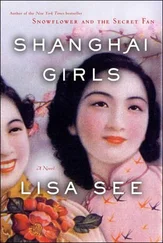Lisa See - Peony in Love
Здесь есть возможность читать онлайн «Lisa See - Peony in Love» весь текст электронной книги совершенно бесплатно (целиком полную версию без сокращений). В некоторых случаях можно слушать аудио, скачать через торрент в формате fb2 и присутствует краткое содержание. Жанр: Старинная литература, на английском языке. Описание произведения, (предисловие) а так же отзывы посетителей доступны на портале библиотеки ЛибКат.
- Название:Peony in Love
- Автор:
- Жанр:
- Год:неизвестен
- ISBN:нет данных
- Рейтинг книги:4 / 5. Голосов: 1
-
Избранное:Добавить в избранное
- Отзывы:
-
Ваша оценка:
- 80
- 1
- 2
- 3
- 4
- 5
Peony in Love: краткое содержание, описание и аннотация
Предлагаем к чтению аннотацию, описание, краткое содержание или предисловие (зависит от того, что написал сам автор книги «Peony in Love»). Если вы не нашли необходимую информацию о книге — напишите в комментариях, мы постараемся отыскать её.
Peony in Love — читать онлайн бесплатно полную книгу (весь текст) целиком
Ниже представлен текст книги, разбитый по страницам. Система сохранения места последней прочитанной страницы, позволяет с удобством читать онлайн бесплатно книгу «Peony in Love», без необходимости каждый раз заново искать на чём Вы остановились. Поставьте закладку, и сможете в любой момент перейти на страницу, на которой закончили чтение.
Интервал:
Закладка:
Instead, he ordered our servants to give us their coarsest clothes. We changed into them and then the concubines, our sons, your parents, and your grandfather and I went to a small outbuilding to hide. My husband gave us women silver and gems to sew into our garments, while the men tucked pieces of gold into their topknots, shoes, and waistbands. On the first night, we hid in the dark, listening as people were killed. The cries of those who were not blessed with a quick death, but suffered for hours as their blood ran out of them, were pitiful.
“On the second night, when the Manchus slaughtered our servants in the main courtyard, my husband reminded me and his concubines that we were to safeguard our chastity with our lives and that all women should be prepared to make sacrifices for their husbands and sons. The concubines were still concerned with the fate of their gowns, powders, jewels, and ornaments, but your mother and I did not need to hear this admonition. We knew our duty. We were prepared to do the correct thing.”
Grandmother paused for a moment and then continued. “The Manchu soldiers looted the compound. Knowing they would eventually come to the outbuilding, my husband ordered us onto the roof, a tactic that had already proved fatal to many families. But we all obeyed. We spent the night in the pouring rain. When dawn broke, the soldiers saw us huddled together on the roof. When we refused to come down, the soldiers set fire to the building. We scrambled quickly back to the ground.
“Once our feet touched the earth,” Grandmother went on, “they should have killed us, but they didn’t. For this we can thank the concubines. Their hair had fallen loose. They weren’t accustomed to such rough clothes, so they’d loosened them. Like all of us, they were soaked, and the weight of the water pulled their garments away from their breasts. This, in addition to the pretty tears on their eyelashes, made them so alluring that the soldiers decided to keep us alive. The men were herded to an adjacent courtyard. The soldiers used rope to bind us women together around our necks, as if we were a string of fish, and then they led us into the street. Babies lay on the ground everywhere. Our golden lilies, which your mother ( 1 3 4 )
and I had tried so hard to strengthen, slipped in the blood and smashed organs of those who’d been trampled to death. We walked next to a canal filled with the floating dead. We passed mountains of silks and satins that had been looted. We reached another compound. When we walked in, we saw perhaps a hundred naked women, wet, muddy, crying. We watched men pull women out of that quivering mass and do things to them—in the open air, in front of everyone, with no regard to propriety.”
I listened in horror. I felt terrible shame as my mother, my grandmother, and the concubines were told to strip and the rain pelted their naked bodies. I stayed by my mother’s side as she took the lead and wormed her way safely into the center of the crowd, all the while attached by the rope around her neck to her mother-in-law and the concubines. I saw that women in these circumstances no longer lived in the human world. Mud and excrement were everywhere, and my mother used them to smear the faces and bodies of the women in our family. All day they held on to one another, always shifting to the center as women from the edges were grabbed, raped, and killed.
“The soldiers were very drunk and very busy,” Grandmother went on.
“If I could have killed myself, I would have, because I’d been taught to value my chastity above all else. In other parts of the city, women hanged themselves and cut their own throats. Others locked themselves in their chambers and set fire to the rooms. In this way whole households of women—babies, little girls, mothers, grandmothers—burned to death.
Later they would be venerated as martyrs. Some families would argue over who would claim this or that dead woman for her virtuous suicide, knowing of the honors that would be bestowed on them by the Manchus. We are taught that only in death can we preserve our virtue and integrity, but your mother was different. She was not going to die, and she wouldn’t allow herself or any of us to be raped. She made us crawl through the other naked women until we reached the back edge, and then through sheer will she convinced us to attempt an escape through the rear of the compound. We made it and were once again outside. The streets were lit by torches, and we scurried together like rats from one dark alley to another. We stopped when we thought it was safe, freed ourselves of the rope, and stripped the dead and clothed ourselves. Several times we dropped to the ground, grabbing loose entrails to drape over our bodies and pretending to be corpses. Your mother insisted that we return to find your father and grandfather. ‘It is our duty,’ she kept saying, even as my courage wavered and the concubines cried and whimpered.”
( 1 3 5 )
Grandmother paused again. I was grateful. I reeled from what I was seeing, feeling, and hearing. I fought back the tears I felt for my mother.
She’d been so brave and suffered so much, and she’d kept it all a secret from me.
“On the morning of the fourth day,” Grandmother continued, “we reached our compound and miraculously found our way to the girls’ lookout pavilion, which your mother was sure would be unattended. We used it as girls and women have before and since, to see but not be seen. Your mother held her hands over my mouth to muffle my screams when we saw my sixth and seventh sons hacked to pieces with sabers and then hauled out to the street in front of the compound, where they—like so many others—were trampled until there was nothing left but mush and fragments of bone. My eyes were parched by the horror.”
This is how my uncles came to be hungry ghosts. With no bodies, they couldn’t be buried properly. The three parts of their souls were still roaming, unable to complete their journeys, unable to find rest. Tears dripped down Grandmother’s cheeks, and I let mine flow as well. Below us in the earthly realm a terrible storm lashed Hangzhou.
“Your mother could not sit and wait,” Grandmother remembered.
“She had to do something—with her hands, if nothing else. At least that’s what I thought. She told us to rip out the stitches that held the silver and gems. We did as we were told and then she held out her hands to take the glittering pieces. ‘Stay here,’ she said. ‘I will send help.’ Then, before any of us could stop her—we were paralyzed with fear and grief—she got to her feet and stepped out of the girls’ lookout pavilion.”
I felt sick and filled with dread.
“An hour later, your father and grandfather came to us,” she said.
“They’d been beaten and they looked frightened. The concubines threw themselves on your grandfather’s feet, sobbing and thrashing on the ground. Making noise is what they were doing, attracting attention. I had never loved your grandfather. It was an arranged marriage. He did his duty, I did mine. He had his business and left me alone to follow my own interests. But in that moment I felt nothing but contempt for him, because I could see there was a part of him—in this most terrible of circumstances—that enjoyed having those pretty girls slithering like greased snakes all over his shoes.”
“And Baba?”
“He did not say a word, but he had a look on his face that no mother should see—guilt for having left your mama behind, combined with a de-
( 1 3 6 )
sire for survival. ‘Hurry!’ he said. ‘Get up! We must move quickly.’ And we did as we were told, because we were women and we now had men to tell us what to do.”
“But where was Mama? What happened to her?”
But Grandmother was reliving what happened next. As she continued speaking, I searched for my mother, but she remained hidden. It seemed I could only follow this story through my grandmother’s eyes.
Читать дальшеИнтервал:
Закладка:
Похожие книги на «Peony in Love»
Представляем Вашему вниманию похожие книги на «Peony in Love» списком для выбора. Мы отобрали схожую по названию и смыслу литературу в надежде предоставить читателям больше вариантов отыскать новые, интересные, ещё непрочитанные произведения.
Обсуждение, отзывы о книге «Peony in Love» и просто собственные мнения читателей. Оставьте ваши комментарии, напишите, что Вы думаете о произведении, его смысле или главных героях. Укажите что конкретно понравилось, а что нет, и почему Вы так считаете.












